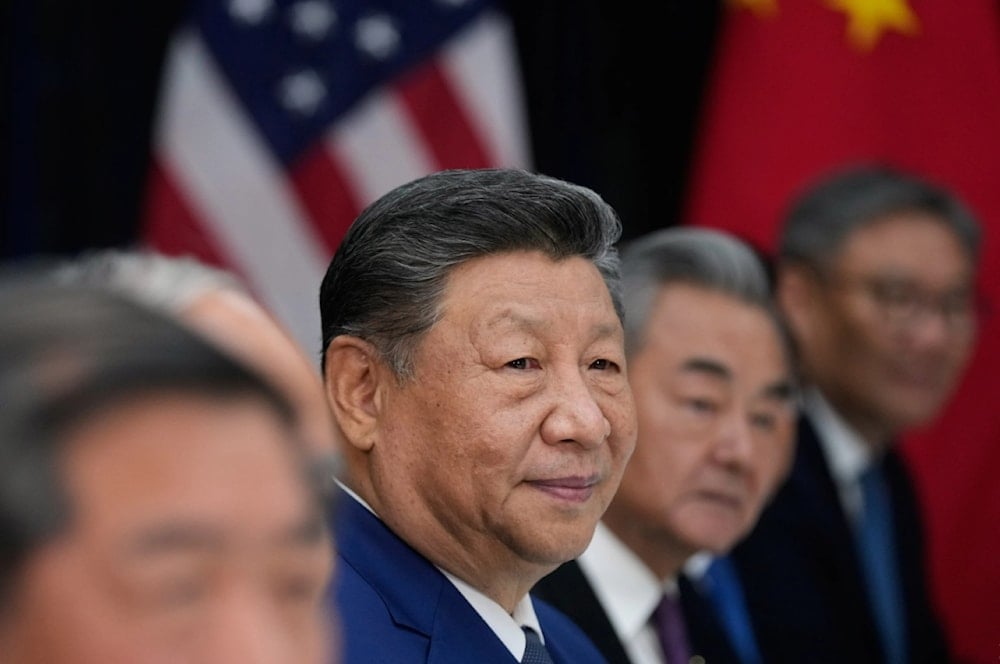Xi to investors: Investing in China means investing in the future
Chinese President Xi Jinping used the APEC summit to promote China as a secure and innovation-driven investment hub while leveraging renewed US-China trade cooperation to project stability, openness, and leadership in the global economy.
-

Chinese President Xi Jinping, center, meets with President Donald Trump, not in photo, at Gimhae International Airport in Busan, South Korea, Thursday, Oct. 30, 2025. Chinese Foreign Minister Wang Yi is at center right. (AP Photo/Mark Schiefelbein)
Chinese President Xi Jinping urged international investors to see China as a prime destination for forward-looking business ventures, describing the nation as both safe and full of opportunity, in a message addressed to business leaders at the Asia-Pacific Economic Cooperation (APEC) summit on Friday.
"China is an ideal, safe, and promising destination for global investors. Partnering with China means embracing opportunities. Believing in China means being optimistic about tomorrow. And investing in China means investing in the future," Xi said in a letter published by the Chinese Foreign Ministry.
The Chinese leader affirmed his country's commitment to developing emerging industries and modernizing established ones, highlighting the rapid growth of green and digital technologies. He described innovation as the cornerstone of China's economic trajectory, positioning technological advancement as central to the country's investment landscape.
Rekindled Trade Diplomacy
His appeal to global investors came just days after high-profile trade talks with US President Donald Trump, during which both sides agreed to reduce tariffs and pause export restrictions, a breakthrough that temporarily eased tensions between the world's two largest economies. According to reports, the US agreed to lower tariffs on Chinese goods from around 57% to 47%, while China pledged to suspend new export controls on rare earth elements and increase imports of American agricultural products, including soybeans.
In addition to tariff reductions, the two leaders discussed supply chain resilience, technology transfer, and rare earth cooperation, marking the most constructive dialogue between Washington and Beijing in years. Analysts said the one-year suspension of export controls on critical minerals gave China both strategic breathing room and leverage for future negotiations, while the partial rollback of US tariffs offered economic relief to Chinese exporters facing mounting costs.
The diplomatic breakthrough provided Beijing with an opportunity to project stability and economic openness at the APEC forum, strengthening its image as a reliable trade partner amid shifting global supply chains and Western protectionist trends. The deal also allowed China to retain influence over strategic industries, particularly in green energy and advanced manufacturing, while signaling its readiness to cooperate on global trade frameworks.
Read more: Ex-US diplomat says Trump-Xi deal 'tactical retreat', not lasting deal
By coupling his investor-friendly message with the tone of reconciliation from the US-China talks, Xi sought to reassure global markets that China remains committed to openness, modernization, and multilateral engagement. His remarks reinforced Beijing's broader narrative of being both a pillar of regional stability and a driver of sustainable economic growth within the Asia-Pacific region, especially as Washington's trade posture under Trump becomes increasingly unpredictable.
Economists note that Xi's outreach to global investors also complements China's domestic strategy of dual circulation, which prioritizes both internal consumption and external investment. In doing so, Beijing aims to reduce dependence on Western markets while attracting high-tech and green capital from Asia, the Middle East, and Europe.

 3 Min Read
3 Min Read








